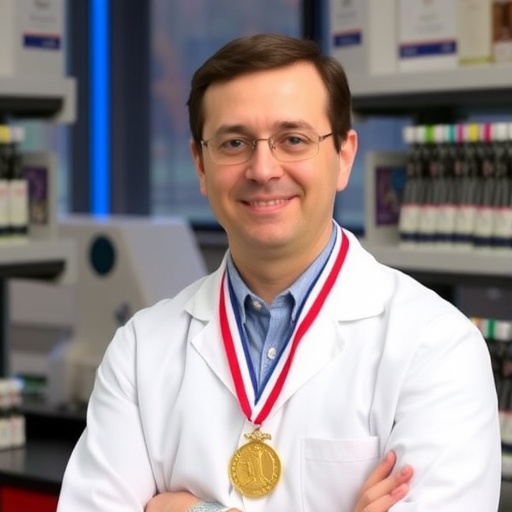Professor Matt Rosseinsky Honored with Royal Medal for Pioneering Advances in Materials Science
Professor Matt Rosseinsky, a distinguished researcher at the University of Liverpool, has been awarded the prestigious Royal Medal for Physical Sciences by the Royal Society—one of the highest recognitions in UK scientific achievement. This accolade celebrates his groundbreaking contributions to the design and discovery of novel materials, a field that sits at the intersection of chemistry, physics, and cutting-edge computational methods. His work fundamentally reshapes how scientists approach synthesis, leveraging digital tools and artificial intelligence to unlock materials with unprecedented properties.
The Royal Medal, bestowed annually by the monarch upon the recommendation of the Royal Society, acknowledges the most significant scientific advancements in physical, biological, and applied sciences. Since its inception in 1825 by King George IV, the award has honored illustrious figures such as Francis Crick, Frederick Sanger, and Max Perutz—scientists whose discoveries have transformed modern science. Joining this lineage, Professor Rosseinsky’s recognition highlights the contemporary importance of materials chemistry in addressing global challenges.
Materials science sits at the heart of technological innovation, underpinning the electronics, energy systems, and sustainable manufacturing that define the modern era. The demand for materials with tailored functionalities and superior performance has never been greater, driven by aspirations to produce cleaner energy, enhance electronic devices, and develop sustainable industrial processes. Professor Rosseinsky’s pioneering research enables accelerated discovery of such materials, employing an innovative synergy between chemical insight and computational intelligence.
At the core of Rosseinsky’s research is the integration of artificial intelligence with expert-guided synthesis. Unlike conventional trial-and-error approaches, his methodology uses machine learning algorithms to predict promising material compositions and structures. This digital design is constantly refined by experimental validation, ensuring that computationally-discovered materials are not merely theoretical constructs but tangible solids synthesized in the laboratory. This iterative approach marks a paradigm shift in materials discovery workflows.
One of the remarkable aspects of this research is the ability to explore chemical space beyond incremental modifications of known materials. By employing data-driven models, the research team navigates complex multidimensional parameter spaces to predict materials with novel electronic, magnetic, or catalytic properties. These discoveries often challenge existing theoretical frameworks, expanding our fundamental understanding of solid-state chemistry and condensed matter physics.
In recent years, Professor Rosseinsky has applied these approaches to the design of energy materials. For instance, his work on next-generation battery components and catalysts for fuel cells aims to overcome limitations in efficiency and durability. The implications extend across clean energy technologies, where improved materials can reduce costs and environmental impacts, facilitating large-scale adoption of renewable energy solutions. Such advancements are crucial for meeting climate targets worldwide.
Beyond the materials themselves, the work emphasizes methodological innovation. The Materials Innovation Factory at the University of Liverpool serves as a hub where interdisciplinary teams leverage automated synthesis platforms, high-throughput experimentation, and real-time data analytics. This infrastructure exemplifies the future of materials chemistry research—highly integrated, data-rich, and collaborative—accelerating the path from conceptual design to functional material.
Professor Rosseinsky’s career reflects a sustained commitment to excellence and impact. Since joining the University of Liverpool in 1999, he has contributed not only through groundbreaking research but also by fostering collaborations between academia and industry. Partnerships with global companies such as Unilever, Johnson Matthey, and Ceres Power highlight the translational value of his work, bridging fundamental science and commercial applications.
His leadership is also recognized by his involvement in governing bodies such as the Engineering and Physical Sciences Research Council (EPSRC). Through this role, he has influenced national science policy and investment strategies, helping to shape the research landscape to better support innovation in materials chemistry and related disciplines.
The Royal Medal adds to a distinguished list of honors, including the inaugural de Gennes Prize for Materials Chemistry and the Royal Society’s Hughes and Davy Medals. In 2024, he was appointed Officer of the Order of the British Empire (OBE) for services to materials chemistry research and innovation. These accolades collectively attest to his status as a leading scientist whose work not only advances theoretical science but also drives practical technological progress.
Reflecting on his award, Professor Rosseinsky emphasized the collective nature of scientific advancement. He acknowledged the multidisciplinary teams at the University of Liverpool, academic collaborators, industrial partners, and funding agencies such as EPSRC and the Leverhulme Trust. This recognition underscores the importance of collaborative ecosystems in tackling complex scientific challenges and translating discoveries into societal benefits.
The Royal Society, founded in 1660, is the world’s oldest scientific academy in continuous existence. It remains committed to promoting excellence in science and its application to societal needs. Sir Adrian Smith, President of the Royal Society, lauded this year’s cohort of medal recipients for their outstanding contributions to science and engagement with broader audiences, reinforcing the society’s mission to celebrate diversity and impact across disciplines.
Professor Matt Rosseinsky’s receipt of the Royal Medal for Physical Sciences epitomizes the transformative potential of integrating digital technologies with classical scientific expertise. His pioneering materials research is poised to catalyze revolutions in energy, electronics, and sustainable manufacturing, affirming the pivotal role of chemistry and materials science as foundations of 21st-century innovation.
Subject of Research: Materials design and discovery through artificial intelligence and chemical synthesis.
Article Title: Professor Matt Rosseinsky Awarded Royal Medal for Pioneering Materials Research
News Publication Date: 2025
Web References: https://mediasvc.eurekalert.org/Api/v1/Multimedia/0cca7e78-4c59-467e-8a3b-25c78f400e6f/Rendition/low-res/Content/Public
Image Credits: University of Liverpool
Keywords
Materials science, Chemical properties, Physical properties, Chemical processes, Inorganic chemistry, Physical sciences




